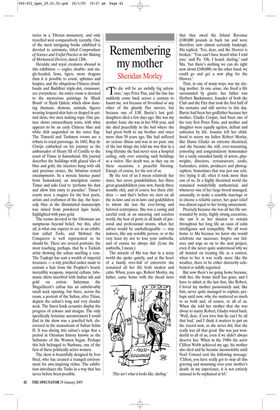Remembering my mother
Sheridan Morley
‘To die will be an awfully big adventure,’ says Peter Pan, and the line has suddenly come back across a century to haunt me, not because of Neverland or any other of the ghastly Pan movies, but because one of J.M. Barrie’s last goddaughters died a few days ago. She was my mother Joan: she was in her 95th year, and she died peacefully in the bed where she had given birth to my brother and sister more than 50 years ago. She had suffered no serious illness and was in no pain: one of the last things she told me was that in a long lifetime she had never seen a hospital ceiling, only ever entering such buildings as a visitor. Her death was, as they say on these occasions, a peaceful blessing. Except, of course, for the rest of us.
By the rest of us I mean relatively her sister, her seven grandchildren, her three great-grandchildren (one new, barely three months old), and of course her three children — and that’s before we start on all the in-laws and ex-in-laws and godchildren to whom she was the ever-loving and beloved centrepiece. She was a caring and careful rock in an uncaring and careless world, the best of ports in all kinds of personal and professional storms, when her advice would be unchallengeable — stay indoors, like any sensible person, or at the very least try not to lose your umbrella, and of course we always did. (Lose the umbrella, I mean.) The miracle of Ma was that in a noisy world she spoke quietly, and at the heart of a family over-full of extroverts she remained all her life both modest and calm. When, years ago, Robert Morley, my father, came home with the dread news that they owed the Inland Revenue £100,000 pounds in back tax and were therefore now almost certainly bankrupt, Ma replied, ‘Yes, dear, and the Hoover is broken.’ ‘You can’t have heard what I told you,’ said Pa. ‘Oh, I heard, darling,’ said Ma, ‘but there’s nothing we can do right now about £100,000; on the other hand, we could go and get a new plug for the Hoover.’ That, in one of many ways, was my darling mother. In one sense, she lived a life surrounded by giants: her father was Herbert Buckmaster, founder of both the Club and the Fizz that took the first half of his surname and still survive to this day. Barrie had been her godfather because her mother, Gladys Cooper, had been one of his very first Peter Pans, and mother and daughter were equally ageless, defiant and unbeaten by life. Joannie left her childhood to marry my father Robert Morley, like Dame Gladys an extreme theatrical, and she became the still, ever-reassuring, consoling and congratulatory homemaker for a vastly extended family of actors, playwrights, directors, restaurateurs, cooks, bartenders, artists, producers and photographers. Sometimes that was just one relative trying it all, often it took more than one of us. In a highly theatrical world she remained wonderfully untheatrical, and whenever one of her large brood managed, unusually, to make a sensible marriage or to choose a reliable career, her quiet relief was almost equal to her loving amazement.
Precisely because she was all her life surrounded by noisy, highly strung eccentrics, she saw it as her mission to remain throughout her long life an oasis of calm intelligence and tranquillity. We all went home to Ma because we knew she would celebrate our successes, forgive our failures and urge us on to the next project, even if she never quite understood why we all insisted on treating life as a contest, when to her it was really more like the weather, there to be either discreetly celebrated or mildly regretted.
But now there’s no going home because, with her, the home itself has gone; and I have to admit at the last that, like Robert, I loved my mother passionately and, like him, never quite managed to explain, perhaps until now, why she mattered so much to us both and, of course, to all of us. When she told her mother that she was about to marry Robert, Gladys wired back: ‘Well, dear, if you love him he can’t be all that bad,’ and I think it matters to put on the record now, as she never did, that she really was all that good. She was just wonderful to all of us, even if we didn’t always deserve her. When in the 1940s the actor Clifton Webb achieved my age, his mother also died and he became inconsolable until Noël Coward sent the following message: ‘Clifton, you have really got to stop all this grieving and mourning over your mother’s death: in my experience, it is not entirely unusual to be orphaned at 65.’















































 Previous page
Previous page